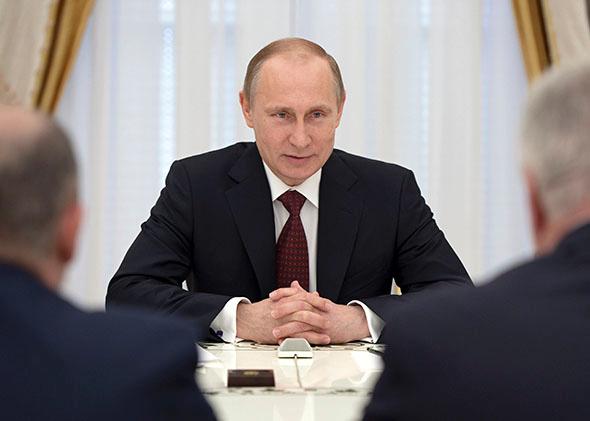LONDON—Seven Russians were added to the American sanctions list this week, along with 17 Russian companies. In Brussels the European Union also lengthened its sanctions list from 33 to 48. Once again, analysts are looking at the names, the assets, the influence of the people targeted. Once again, some ask whether any sanctions can ever work, at least well enough to change anyone’s behavior.
And once again, it’s all rather beside the point. Yes, it’s true that sanctions feel quite satisfying—think of all of those fat-fingered men who can no longer use their Visa cards at the Rolex shop—and that some very unpleasant people are on the lists. It’s also true that sanctions have genuinely made international markets jittery about doing business with Russia, not least because they have shown that Russia is now run by people who don’t care anymore about international markets, or at least not as much as they care about territorial expansion.
But no, even if we put 500 people on the lists, or 5,000, sanctions aren’t the solution to the existential challenge that Russia has thrown at Europe and the international legal system. More to the point, these sanctions lists are a symptom of a deeper problem. For years now, this is how the U.S. and the European Union have made their foreign policies: reactively, tardily, when it is already far too late. The time to worry about corrupt Russian companies doing business in the West was 15 years ago, before they became part of the international financial system. The time to start talking about Vladimir Putin’s hidden money was in the 1990s, when he was first accused of defrauding the city of St. Petersburg.
Knowing this doesn’t help us now, of course. The postmodern invasion of Ukraine is underway; two eastern provinces are headed toward separatism or union with Russia; the destabilization of Kiev itself may be next. But if nothing else, maybe these events will belatedly wake up the slumbering foreign ministries of the West to the news that they have a long-term problem, and that it requires long-term solutions.
As I’ve written, the West needs to rethink its military strategies in order to counter new tactics—paramilitary and psychological—that Russia has begun to deploy. But we could also begin to think even more strategically about the threat to both the eastern and the western halves of Europe that is posed by Russian influence on international energy markets in general, and on European natural gas pipelines in particular. I don’t mean the immediate threat to turn off the gas, but the long-term threat posed by companies such as Gazprom, state entities in everything but name, and their monopolistic practices. The danger they pose is both political and economic. Gazprom goes out of its way to hire senior European politicians, including former Chancellor Gerhard Schroeder of Germany, and spends millions trying to influence political decisions across the continent. Meanwhile, Europeans pay more than double what Americans pay for natural gas, not least because so many of them are buying from a supplier that is deliberately pushing prices upward. This heavy tax on European industry is slowing down the European economic recovery, which among other things keeps European politicians timid and averse to military spending. It also slows down European trade, which is bad for the United States, since Europe is America’s largest trading partner.
A European Union thinking strategically about its future would create an energy union, as some have already suggested, and begin to bargain collectively for its gas. Europeans should also step up construction of the infrastructure needed to import, transport, and store liquefied natural gas. The United States should step up its own efforts to export LNG. At the same time, the United States should take advantage of the shift to shale oil and build the Keystone XL pipeline. A low international oil price is not only bad for the autocrats who run Russia, Venezuela, and other petro-states, it’s good for American allies. This doesn’t mean that the hunt for alternative energy needs to end. But until the miracle fuel is discovered, it would be a lot safer if the West were supplied by the Canadians.
This kind of thinking won’t help Ukraine in the coming weeks. But it might help ensure the economic and political independence of Europe in the coming years. In Russia one widespread conspiracy theory holds that the Soviet Union was somehow “forced” to collapse because Ronald Reagan covertly engineered a drop in global oil prices in the 1980s. It seems laughable to imagine that any American administration could ever have done anything so clever on purpose. But maybe, just once, we could manage it.
